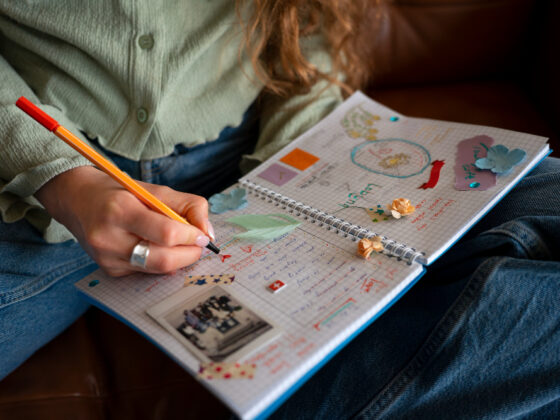I’ve been through this phase a few times in my life – I can count them on one hand.
It’s a weird feeling.
And frustrating as hell.
It feels like the days blur together and everything you used to love feels kinda… dull.
You wake up tired. You go to sleep tired. And in between? You’re just existing. Not sad exactly, but not really okay either.
You try to get back into old routines, but they don’t hit the same.
You try to talk to people, but the words feel stuck in your throat. You scroll past inspirational posts that say “just take the first step” and all you can think is—but what if I don’t even know what direction I’m supposed to be walking in?
That’s the “nothing feels right” phase.
And it sucks.
And you’re not broken for being here.
It happens to more of us than we admit out loud.
It’s that weird, shapeless fog that creeps in when life doesn’t fit anymore—but you don’t know what’s next either. You’re stuck in between versions of yourself, and nothing feels like home.
So no—this post isn’t gonna tell you to “just be positive” or “take a bubble bath and move on.” You deserve better than that. What you need is real softness.
Real steps.
Real reminders that you’re not crazy or lazy or weak.
You’re just in a transition. And yeah—it’s gonna be uncomfortable.
But you’re gonna get through this.
Here’s how.
This post contains affiliate links, meaning I may make a commission at no extra cost to you if you decide to click on a link and purchase something. Click here to read the full disclaimer.
1. Stop Trying to Fix It All at Once
When you’re in that “nothing feels right” headspace, your brain tries to solve it.
Immediately.
You start spiraling:
“What do I need to change?”
“Do I hate my job?”
“Is my relationship wrong?”
“Should I move?? Change careers?? Break up?? Shave my head??”
Pause.
That panic?
It’s your brain freaking out from discomfort, not clarity.
And making huge life decisions while you’re emotionally underwater? Not it.
Give yourself permission to not know yet.
You don’t need to overhaul your life in one night. Start small. Breathe. Let this be a season of observing—not fixing.
I’m genuinely guilty of this. I panic every time something doesn’t feel remotely right so I understand how you feel.
I also highly recommend reading The Science of Stuck by Britt Frank
This book offers practical insights into why we feel stuck and how to move forward, providing tools to actually break through. I genuinely loved this book and it helped me feel less alone because I realized so many others feel this way.
2. Make Your World a Little Smaller
When nothing feels right, the world can feel too loud, too big, too… much.
So shrink it down. Not forever—just for now.
Stop trying to keep up with everything.
Don’t force yourself to go to every event or reply to every text.
Unfollow the accounts that make you feel behind. Skip the news cycle for a day.
I stop opening social media when life gets too much. It’s just too over-stimulating.
Make your world just big enough to hold you. Your quiet moments. Your breath. Your blanket. Your tea. That’s enough right now.
I picked up this book and I loved it. Bittersweet: How Sorrow and Longing Make Us Whole
Susan Cain (the author) talks about the power of embracing bittersweet emotions, helping you actually find beauty in the midst of sorrow.
3. Go Outside—Even If You Don’t Feel Like It
Lol, I might sound like your mom – I am well aware of that.
Listen, I know. It feels pointless.
The sky is the same. The air isn’t magical. But getting out into the real world—even for five minutes—can shake something loose in you.
I started reading this book Stillness is the Key by Ryan Holiday and he talks about how just walking in nature or doing absolutely nothing but focusing on where you step can change your entire world.
It’s the concept of doing nothing that actually helps you see clarity.
Go sit in the sun. Walk around your block. Stand under a tree and just look up for a sec. Touch the bark. Watch a leaf fall.
Stop looking at your phone – don’t even listen to music.
It will feel alarming at first especially if you’re always used to this device being on your person.
But with time, you’ll actually enjoy being free.
You’re not doing it to “fix” yourself.
You’re doing it to remember that life still exists outside of your thoughts. That the world is still turning, still blooming, still moving—even when you’re stuck.
I also recommend reading The Joy of Movement by Kelly McGonigal
because it highlights how physical movement can bring joy and emotional resilience, even in small doses. Read this book if you want inspiration to actually move your body. I’m not kidding when I say that this book has changed the way I operate.
4. Start Moving Your Body in Tiny, Un-Serious Ways
You don’t need a gym routine.
You don’t need to run a 5k. But your body holds your emotions. When you feel stuck? Your body feels that too.
So shake it off—literally.
Stretch your arms like a sleepy cat.
Dance in your kitchen like no one’s watching (even if someone is). Walk barefoot in your house. Roll your shoulders. Bounce a little. Play a silly song and move your hips.
These are all ways to start moving.
I used to be so intimidated by runners in my society or gymmers and it took me time to realize that everyone (even the super athletic ones) all started somewhere.
Start.
That’s all.
Movement doesn’t have to be about “health.”
It can just be a way to come back to yourself.
If you’re stressed, read Burnout: The Secret to Unlocking the Stress Cycle by Emily Nagoski and Amelia Nagoski
These 2 Nagoski sisters explain how physical activity can actually decrease your stress. I recommend it for any adult woman who’s navigating change and needs to reduce their stress.
5. Let Go of Your “Should” List
I understand life is full of responsibilities. And the pressure we put on ourselves is brutal. Even our inside voice can sometimes be so harsh.
You know the one.
“I should have figured this out by now.”
“I should feel grateful.”
“I should be more productive.”
“I should be happy. Other people have it worse.”
Throw it out. Burn it. Rip it up.
The second you let go of the pressure to feel okay all the time… you start to feel less broken for not being okay.
You don’t have to earn rest. Or prove your sadness. Or explain your confusion.
You’re allowed to just be. Without all the shoulds.
The Gifts of Imperfection by Brené Brown
My therapist suggested this to me because I am a perfectionist and I’m still trying to change. Brown encourages embracing our imperfections and letting go of societal expectations to live authentically.
6. Do One Small Thing Just for You (and Make It Silly)
Not a goal. Not a task. Not something productive. Just one tiny thing that feels like a gift to your inner child.
Put stickers on your water bottle.
Eat pancakes for dinner. This particular activity makes me feel so happy.
Watch cartoons.
Read a trashy novel.
Paint your nails bubblegum pink.
Buy the sparkly notebook even if you “don’t need it.”
You don’t have to deserve joy to let it back in.
And sometimes, those silly little moments? They’re the ones that crack the darkness open just enough for the light to sneak in.
Too often we forget to nurture that inner child within us.
Being serious all the time can make us lose that sparkle – and trust me, when you do this, you’ll be able to connect with people so much better.
7. Talk to Someone—Even If You Don’t Know What to Say
You don’t need a speech prepared.
Just say the real thing.
“Hey… I’m not doing great. I don’t really know why.”
Or even: “Can we just talk about nothing? I don’t wanna be alone right now.”
You don’t have to perform your sadness. You don’t need a breakthrough to ask for company.
Let someone sit with you in the messy middle. You don’t have to figure it out alone.
I do this with my closest friends.
And I’ve told them to do the same with me.
Together we lift each other up and it’s one of the best feelings in the world.
I genuinely recommend reading Maybe You Should Talk to Someone by Lori Gottlieb because
This is the book that helped me understand that it’s important for everyone to get therapy. She shares her experiences as a therapist and patient, talking about what it’s like to be human and how we can all learn from each other.
This is such a good book about personal growth, overcoming challenges and just feeling better about yourself.
8. Let Something Go
This is a hard one.
But sometimes when nothing feels right, it’s because you’re holding onto something that isn’t meant for you anymore.
A habit.
A toxic connection.
A belief that you’re supposed to be somewhere else by now.
Maybe you had intense expectations about yourself and your life and because those aren’t being met, you feel let down.
It’s normal, I’ve gone through what you have.
You don’t have to burn your life down.
Just… set one thing down.
One thing that feels heavy.
That makes you feel small.
That no longer aligns with the person you’re quietly becoming.
Letting go isn’t giving up. It’s making space.
Read my post on how to let go.
9. Celebrate the Fact That You Noticed
You are extremely aware of yourself.
Because if you know that nothing feels right, that means something inside you is awake.
You’re aware.
You’re paying attention.
You’re not numb.
And yeah, that hurts—but it also means you’re still here. Still trying.
That awareness? That means you haven’t given up. And that’s worth celebrating.
You’re not lost. You’re in the process.
10. Accept That This Part Is Part of the Story Too
I realized a very important thing in therapy – you can’t always have it figured out.
There will be a few phases in your life where you don’t know where you’re going or what to do and that’s okay.
Sometimes, it’s okay to not have things figured out – or to have a phase where you’re trying to find your way.
This may be a difficult pill to swallow, but this can happen at any age.
Just because you’re in your 30s,40s, or 50s, doesn’t mean you may have it together.
Life just doesn’t work that way.
Sometimes this chapter is just blurry and slow.
And nothing is “happening.” And you’re tired.
And you’re healing things you don’t even have words for.
That doesn’t make this part less sacred.
Growth isn’t only in the glow-up. It’s in the breakdown.
The pause. The confusion.
The quiet becoming.
Try reading The Body Keeps the Score by Bessel van der Kolk
I loved this book because it’s one of the few books that discuss how trauma affects the body and mind, offering pathways to healing.
It’s very raw and involves a lot of work, so pick this up only if you’re ready to read something a bit heavy.
11. Remind Yourself That You’ve Felt Lost Before—and You Always Found Your Way Back
Think about it.
This isn’t the first time you’ve felt unsure. Or scared. Or completely off-track.
But every time, somehow, you got through it.
You found your footing again. You laughed again. You made it out of something that once felt impossible.
This is why in many of my blog posts, I recommend keeping a journal. Sometimes, I flip through it and see that I’ve felt the same way before – stuck, uninspired, hurt and I’ve realized that I’ve gotten over it and found my way back to life again.
So if your brain is whispering “What if this is forever…”—don’t listen.
You’ve come back to yourself before.
You will again.











2 comments
Excellent! Thank you!
You’re welcome.